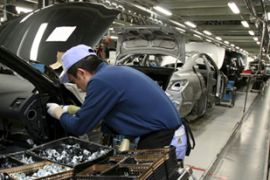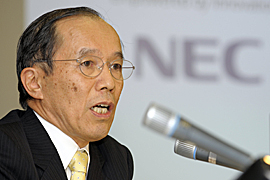Gloom deepens for Japan’s economy
Factory output sees record fall as consumer spending drops and unemployment rises.

Speaking to Al Jazeera at the World Economic Forum in Davos, Aly Khan Satchu, a financial analyst from Nairobi, said: “I think… Japan has always struggled since the post-bubble economics in the nineties, I mean it got floated I think by the expansion in China.
“If you look at the Japanese, Chinese correlation it’s very very high and I think that’s really fallen apart.
“It’s really an export thing, there isn’t demand right now and I think it’s a question of credit. The whole system, the global system, was built on credit, the withdrawal of credit is asphyxiating everybody and I think this is clear data confirming that”.
Job cuts
It follows an 8.5 per cent drop in November and comes as companies have been forced to cut output as demand for their cars, electronics and machinery evaporates.
And the government is predicting further steep declines, with Kaoru Yosano, the economics minister, admitting that “this drop is likely to continue”.
Factories are already operating at their lowest level in 20 years, but inventories have risen for a fourth straight month to record highs, indicating more slashing of output and corresponding jobs ahead.
Japan’s jobless rate rose to 4.4 per cent in December while the availability of jobs sank to a five-year low.
Electronics giant NEC said on Friday that it would axe 20,000 jobs worldwide, while Hitachi said it would cut up to 7,000 jobs in its struggling auto equipment and electronics divisions.
 |
| Kaoru Yano said he was seeking to improve NEC’s fixed costs [AFP] |
Kaoru Yano, NEC’s president, said: “With these measures we will seek to improve our fixed costs in order to convert to a more muscular profit structure.”
NEC said its operations had worsened all round, from information technology to mobile and electronic devices, as the company faces a deepening global slump and escalating competition in the electronics industry.
Related fears for the health of the US economy and its effect on Japanese exports, along with a strengthening yen weighing on exporters, drove Japanese share prices down on Friday, with the Nikkei closing 3.1 per cent lower.
While the benchmark index gained 3.2 per cent for the week, largely due to a three-day winning streak, it was down 9.8 per cent for the month – its worst month since October, when it fell 24 per cent.
Car troubles
A string of corporate profit warnings, including one from car giant Honda on Friday and rival Toyota expected next Friday, exacerbated investors’ worries.
 |
| Japan’s car industry has been heavily hit by the global economic downturn [File: EPA] |
Honda announced a 90 per cent fall in net profit from ¥200bn ($2.2bn) to ¥20bn for the October-December quarter from a year earlier.
Honda also cut its profit forecast for the fiscal year to March by 57 per cent, to ¥80bn from ¥180bn.
Japanese media reports said Toyota was expecting its first annual net loss in more than 40 years.
The Kyodo News agency and The Nikkei newspaper reported that the country’s biggest car maker was to revise down its projections for the third time, with the operating loss now expected at around ¥400bn ($4.5bn) from the earlier projection of ¥150bn.
A spokesman for Toyota declined to comment.
The Japan Automobile Manufacturers’ Association said on Friday that the country’s total auto productions had fallen by 25.2 per cent in December from the previous year.
It was the steepest decline since comparable records began in 1967.
“The environment surrounding the industry will remain severe this year,” the industry group warned.
Severe downturn
Friday’s data also showed consumer inflation had fallen sharply to 0.2 per cent in December from one per cent a month earlier.
Jan Friedrich of the Economist Intelligence Unit in Hong Kong said that Japan was suffering its most severe downturn since the second world war.
“The main driver for that is certainly the external side. Japan has been running very much on a single export engine, with very little autonomous domestic demand,” he told Al Jazeera.
“As the external side is falling apart there is very little else left driving the economy.”